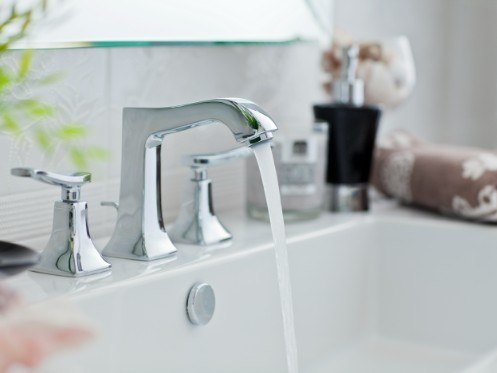When last assessed by the United States Environmental Protection Agency (EPA), the tap water in Beckley, WV met all federally established health and safety standards. However, this hardly means that it’s actually healthy and safe. If you’re unhappy with the look, smell, or taste of what comes out of your faucets, you’re not alone. Rather than paying a veritable fortune for bottled water, countertop water filter replacements, or single-faucet filtration, you should invest in a whole-house water filter. With an in-depth look at the region’s water quality and an overview of the benefits that whole-house water filters provide, the following are several reasons why these increasingly popular home additions are more than worth their cost.
The EPA’s Legal Limits Don’t Optimally Protect Human Health
EPA standards set the most basic requirements for water health and safety, especially when considering that manufacturing and the related risks for groundwater pollution have changed dramatically over time. As of 2023, the legal limits for contaminants in potable water haven’t been updated by the EPA in more than 20 years. According to the Environmental Working Group, legal doesn’t always mean safe. The EPA doesn’t test for all contaminants that are commonly found in groundwater, reservoir water, and municipally treated water supplies. Moreover, only a small handful of the contaminants actually tested for are found in consumer confidence reports and other water quality data made publicly available.
Contaminants in Beckley’s Water Supply That Are Above Health Recommendations
While under the federally allowed limit, several chemical contaminants in Beckley’s water supply are recognized by many health experts as being present in concentrations that are too high for safe consumption. Among these are the following:
- Trichloracetic acid
- Dichloracetic acid
- Bromodichloromethane
- Chloroform
There’s also high concentrations of radiological contaminants and total trihalomethanes (TTHMs) as well as an abundance of fluoride. TTHMs are the result of intentional additions such as chlorine and chloramine, which are used by water treatment plants for the eradication of harmful microorganisms. TTHMs are but one of many byproducts of the chemical activities that occur during the water treatment process. In short, although the water that comes from your taps is clear, clean-looking, and legally deemed as potable, you never really know what’s in it.
How Unfiltered Water May Be Harming Your Health and Your Looks
Many homeowners are purchasing bottled water or relying on simple, single-faucet or countertop water filters simply because they don’t like the look, smell, or taste of their water. Unfortunately, drinking purified or spring water isn’t a reliable way to protect your health when your home’s water quality is an ongoing concern. The water that you aren’t willing to drink is the very water that’s coming out of your showerheads, filling your tubs, powering through your bidets, and filling your pots and pans when you cook.
Although consumption is a sure route of exposure, you’re also being exposed to the higher-than-healthy amounts of chemical contaminants in your water when bathing, brushing your teeth, and boiling noodles. This same exposure could be responsible for persistent rashes and other skin irritation, lowered immunity, recurring headaches, mouth sores, and more. Some people even report having problems with thinning hair or accelerated hair loss as the result of poor water quality.
Fluoride alone, an intentional addition to municipally treated water, is believed to calcify the pineal gland, alter the density of bone and brain matter, and incite structural bone changes. Even if your home’s water isn’t having an immediate and noticeable impact on your health, it might have more conspicuous effects further down the road.
Breathe Easier With a Whole-House Water Filter
Whole-House water filters serve every single tap. Whether you’re drawing water from the kitchen sink to make soup or filling up a bathtub, you can rest assured that the quality of your water is consistently high throughout the building. Whole-house water filters eliminate many of the contaminants that water treatment facilities don’t address and the contaminants that remain present in higher-than-healthy concentrations after treatment. By eliminating residual chlorine and chloramine, and the resulting TTHMs, these installations prevent many skin and scalp problems caused by contact exposure. They also allow for improvements in respiratory health. Not only are you affected by the waterborne contaminants that you consume and shower in, but you’re also impacted by the steamy aerosols you breathe in.
Enjoy Water That Looks, Tastes, and Smells Fresh
Having fresh, clean water at every tap won’t just improve your skin, hair, and respiratory health. In some instances, it can also mean having fewer spots on your dishes, cleaner and brighter-looking laundry, and better-looking, higher-performing fixtures and appliances. If you love to cook, a whole-house water filter will have a remarkable impact on the taste and appearance of your baked goods and other finished products. Best of all, you won’t have to lug heavy bottles or jugs of water into your home or regularly replace filters at every pitcher or faucet.
If you have single-faucet filters or a number of countertop water filters, you can easily recoup a good portion of your up-front costs. After all, a whole-house water filtration system has just a single filter for homeowners to change, and most of these systems only require filter replacements every three to six months. To compare, even fairly small-sized households can spend approximately $700 a year on bottled water. The average cost of replacing filters in a whole-house water filtration system is between $50 and $150 annually.
Do Something Good for the Natural Environment
An ongoing reliance on bottled water takes its toll in other ways. This is especially true when consumers primarily consume water from disposable plastic water bottles. Throughout the United States, over 40 billion plastic water bottles are used every month. Even when these products are fully recyclable, they often wind up in landfills or, worse still, as litter on city streets and in local waterways.
With all of the water in your home undergoing multi-stage and highly effective filtration, you can use regular tap water and refillable water bottles for on-the-go consumption. More importantly, you can limit the amount of petroleum-based waste that you’re tossing into the trash. When multiple filtration units throughout the home are used to supplement bottled water, homeowners can also minimize their filter waste with whole-house filtration.
What a Whole-House Water Filter Can Do That Other Filtration Equipment Can’t
Simple, countertop water filters limit the concentrations of chlorine and chloramine in tap water. In essence, they get rid of the unpleasant bleach taste and smell that municipally treated water often has. However, countertop filters do nothing to remove fluoride, TTHMs, or other harmful chemicals. It’s also important to remember that these units are only designed to treat water for direct consumption.
Installing single-fixture filters won’t provide better results. Having a single-fixture filter attached to your showerhead will minimize concentrations of certain contaminants, but it will not eliminate them entirely. Moreover, many contaminants bypass these installations altogether. Comparatively, whole-house water filters reliably remove arsenic, lead, chlorine, chloramine, nitrates, TTHMs, and more. Some systems are even effective for eliminating artificial “forever” chemicals or polyfluoroalkyl substances (PFAS).
We’re committed to helping residents of Beckley, WV make informed decisions about their plumbing systems. We offer top-notch HVAC, plumbing, and electrical services. We also provide water heaters, water softeners, and whole-house water filtration systems. To find out more or to schedule an appointment, contact us at Childers Air Plumbing & Electric today.

